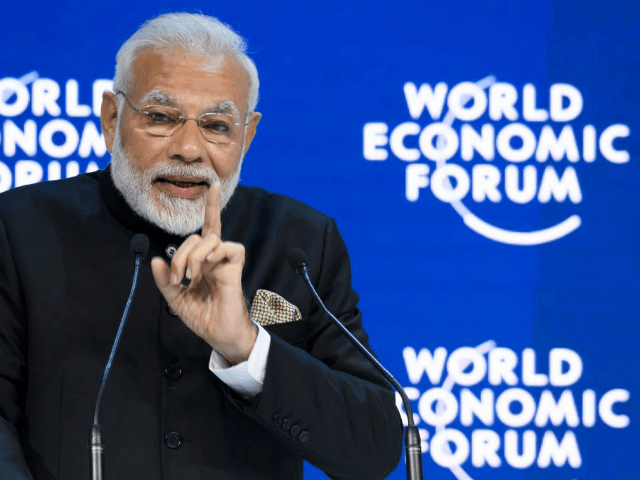Giving the opening speech at the World Economic Forum’s Davos summit Tuesday, Indian prime minister Narendra Modi told global elites that opposition to globalist policies is one of the world’s foremost threats.
“Forces of protectionism are raising their heads against globalisation, their intention is not only to avoid globalisation themselves but they also want to reverse its natural flow,” said the Indian leader, lamenting that the creation of globalist trade deals “had come to a kind of standstill”.
“The result of all this is that we get to witness new types of tariff and non-tariff barriers,” Modi complained, prompting international media outlets to report his speech as a rebuke to the “America First” policies of U.S. President Donald Trump.
On Monday, the American leader imposed tariffs on imported washing machines and solar panel components in response to evidence that “increased foreign imports … are a substantial cause of serious injury to domestic manufacturers”.
“All of us, we are linked together as one family. Our destiny is a common thread that links all of us,” said Modi, complaining that the world has lost its “feeling of solidarity”.
The liberal media’s hailing of Modi at Davos as an antidote to Trump sharply contrasts much of its previous attention towards the Indian leader, who is regularly portrayed as a “deplorable” nationalist and populist in a similar mould to the American president.
Bosses of major corporations in western Europe have named populism the biggest threat to their growth prospects, according to a report published Monday.
Professional services network PwC’s 21st annual global CEO survey found that 42 per cent of company executives in this region said populism is the chief “extreme concern”, followed by over-regulation (35 per cent), and geopolitical uncertainty (34 per cent).
Mass migration is a major driver of growth for big corporations in the West, growing the number of consumers in rich nations at the expense of middle-class taxpayers.
In 2016, French public service broadcaster France Inter reported “Swedish generosity is the recipe for its wealth”, claiming that the country experienced an “astonishing” economic boom thanks to mass third world migration.
Explaining how this worked, the taxpayer-funded organisation points out that “the Swedish government spends large amounts of money welcoming these people — feeding, clothing and housing them”.
“What does a refugee do when he arrives in Sweden? He buys a sandwich, or an expensive jacket,” states the article, which fails to mention that the profits of a larger population are privatised while taxpayers are left to pick up the tab for costs of healthcare, schooling, and crime increased as a result of mass migration.
As Breitbart London reported last month, the Swedish government announced it will have to raise the retirement age to offset the increasing welfare costs from mass migration-fueled population growth.

COMMENTS
Please let us know if you're having issues with commenting.